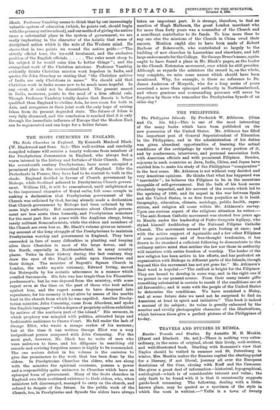THE SCOTS CHURCHES IN ENGLAND.
The Scots Churches in England. By Kenneth Macleod Black. (W. Blackwood and Sons. 5s.)—This well-written and carefully compiled volume will receive a hearty welcome from members of the Presbyterian Communion in England, who always feel a warm interest in the history and fortunes of their Church. Since the seventeenth century Presbyterians have never occupied a prominent place in the ecclesiastical life of England. Like the Protestants in France, they have had to be content to walk in the shade. England decided in favour of Church government by Bishops, while Scotland adhered to Presbyterian Church govern- ment. William III., it will be remembered, until enlightened as to the impersonal character of Royal oaths, felt some scruple in making a declaration that Presbyterian government of the Church was ordained by God, having already made a declaration that Church government by Bishops had been ordained by the same high authority. But controversies about Church govern- ment are less acute than formerly, and Presbyterian ministers for the most part live at peace with the Anglican clergy, being rarely militant Nonconformists, while the elders and members of the Church are even less so. Mr. Black's volume gives an interest- ing account of the long struggle of the Presbyterians to maintain Presbyterian worship and government in England. They have succeeded in face of many difficulties in planting and keeping alive their Churches in most of the large towns, and in the North, especially in Northumberland, in many country places. Twice in their history during the last century they drew the eyes of the English public upon themselves and their doings. The minister of Regent's Square Church in London, the noble mystic visionary, Edward Irving, moved the Metropolis by his ecstatic utterances in a manner which recalled Savonarola. His fate was less tragic than his Florentine predecessor's; but he was deposed from the ministry, with some regret even at the time on the part of those who took action against him, and the regret seems to have deepened into repentance, for his memory is kept alive by means of the marble bust in the church from which he was expelled. Another Presby- terian minister, John Cumming, came from Aberdeen, and spoke the English language "with a degree of propriety seldom exhibited by natives of the northern part of the island." His sermons, in which prophecy was mingled with politics, attracted large and fashionable audiences to Crown Court. He fell under the lash of George Eliot, who wrote a savage review of hie sermons ; but at the time it was written George Eliot was a very insignificant person compared with John Cumming. For the most part, however, Mr. Black has to write of men who were unknown to fame, and his diligence in searching old records and reviving forgotten names is highly to be commended. The one serious defeot in his volume is the omission to give due prominence to the work that has been done by the elders. In Presbyterian Churches the elders, who are along with the minister the spiritual overseers, possess a power and a responsibility quite unknown in Churches which have an episcopal form of government. Many of the Scots churches in England owe their continued existence to their elders, who, when ministers left discouraged, managed to carry on the church, and refused to despair of the future. IA the public work of the Church, too, in Presbyteries and Synods the elders have always taken an important part. It is strange, therefore, to find no mention of Hugh Mathesofi, the great London merchant who for more than forty years was a counsellor of the Church and a munificent contributor to its funds. To him more than to any one else the missions of the Church in China owed their success. Mention ought also to have been made of Robert Barbour of Bolesworth, who contributed so largely to the building of new churches in Lancashire and elsewhere, and left large endowments for the College. Sir George Bruce's name, again, ought to have found a place in Mr. Black's pages, as the leader In the Church Extension movement, over which he still presides. Although as regards the ministers the record is, on the whole, very complete, we miss some names which should have been mentioned. Why, for example, is there no reference to Dr. James Anderson of Morpeth, who for a long series of years exercised a more than episcopal authority in Northumberland, and whose gracious and commanding presence will never be forgotten by those who remember the Presbyterian Synods of an older day?






























































 Previous page
Previous page